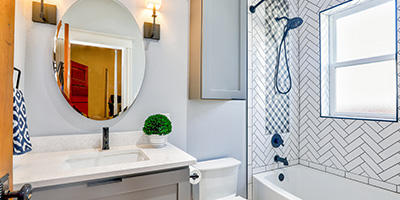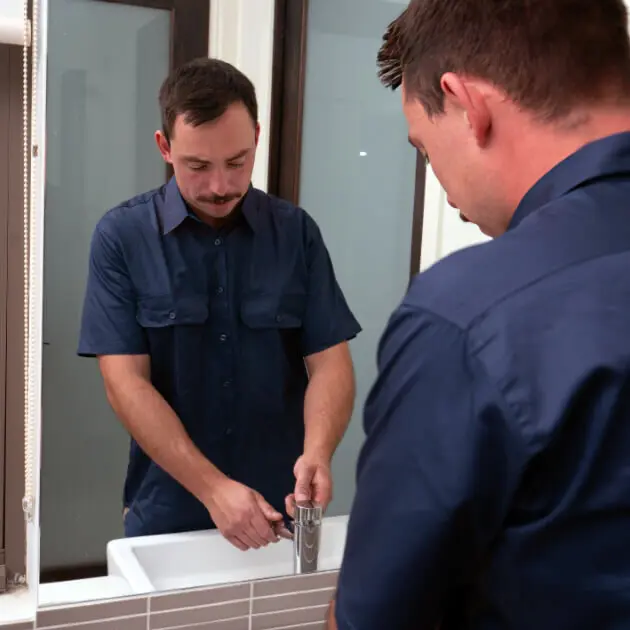What're your beliefs on 6 Essential Plumbing Checks for New Homeowners?

For new property owners, understanding and keeping washroom pipes can conserve both money and time by protecting against expensive issues down the line. Below are some necessary restroom plumbing tips to assist you keep every little thing running smoothly.
Plan For Cold Weather
Safeguard your pipelines from freezing throughout winter by insulating pipelines in unheated areas like cellars, attics, and garages. Throughout extreme cool, let cold water drip from taps served by subjected pipes to help stop cold.
Set Up Regular Maintenance
Consider organizing yearly assessments with a licensed plumbing professional. They can find problems that you might miss, such as covert leaks or deterioration on pipes and components. Normal maintenance aids extend the life of your plumbing system and can protect against emergencies.
Acquaint Yourself with the Main Shut-Off Shutoff
Knowing where the major water shut-off valve lies in your house is important. This allows you to quickly switch off the supply of water in case of significant leaks or during pipes emergencies, preventing considerable water damage.
Frequently Inspect for Leaks
Little leakages can lead to large problems. Frequently inspect under sinks, around commodes, and near pipes fixtures for any indications of leakages. Look for moisture, little drips, or corrosion. Catching and fixing leakages early can prevent a lot more severe damages and save water.
Keep Your Water Heater
Ensure your water heater is readied to an ideal temperature (commonly around 120 degrees Fahrenheit) to stop scalding and minimize energy use. Flush the tank yearly to eliminate debris accumulation, which can lower the performance and life-span of your heating unit.
Update Your Fixtures
If your home has older fixtures, consider updating to much more effective designs. Modern bathrooms, showerheads, and faucets are designed to use less water while providing good pressure, which can significantly reduce your water bill and environmental footprint.
Be Cautious with Do It Yourself Pipes Fixes
While it's appealing to deal with all home repairs on your own, beware with plumbing. Some problems could require specialist experience, specifically if they include main water lines or sewer fixings. Working with an expert can in some cases be a lot more economical than DIY, especially if it protects against more damage.
Don't Overlook Slow Drains Pipes
If your sink or tub is draining slowly, it's usually an indicator of a blockage developing. Resolving this early can protect against a total blockage. Make use of a plunger or a plumbing's serpent to remove debris. Avoid utilizing chemical drain cleansers as they can damage your pipelines in time.
Know What Not to Flush
Bathrooms are not garbage disposals. Stay clear of flushing anything other than bathroom tissue and human waste. Products like wipes, feminine health items, and cotton bud should be dealt with in the garbage to avoid blockages and sewage system back-ups.
Set Up Strainers in Drains
Location strainers in your sink and bathtub drains pipes to catch hair and other particles before they enter your pipes system. Cleaning the filters frequently will assist prevent build-up and maintain water streaming easily.
Final thought
Comprehending and keeping your home's washroom plumbing can avoid many usual issues. By complying with these vital tips, you can guarantee your shower room stays useful and efficient, saving you money and time over time.
Plumbing Tips for New Homeowners: 4 Things You Should Look Out For
Congratulations on buying your home! It is an exciting time for every homeowner. However, there is still lots to do. If you have already owned a house or apartment, you know the lengthy maintenance to-do list ahead of you. You may already have a trusted plumber on speed dial, ready to save you from every plumbing emergency.
Perhaps buying your first home has inspired you to become a handyman finally. It’s great that you want to care for your house and learn new skills to do so correctly.
However, home maintenance can be complicated. Knowing your limits and recognizing when it’s time to call in the professionals is essential. Many tasks require professional training and experience to do correctly. Furthermore, some of these projects are dangerous without the necessary expertise.
Nonetheless, it’s a good idea to understand how your home’s plumbing system works. That way, you know what to look out for, what to fix yourself, and when to contact the plumber.
This article will review some essential plumbing tips for new homeowners.
First, schedule a house inspection.
As a new homeowner, your first order of business is to schedule a house inspection with a professional, licensed plumber. It would be best if you did this before you moved in. The last thing you want the day after unpacking all your belongings is to discover a catastrophic plumbing problem.
A plumbing inspection is crucial in getting to know your new home. After all, you should figure out what parts need work immediately. Chances are, some plumbing elements will require maintenance, repair, or replacement. If you neglect these issues promptly, you may encounter more expensive and extensive repairs.
Your plumbing inspection should also include a drain and sewer line inspection. Professional plumbers use high-tech equipment and cameras to survey sewer systems. They check on the condition of the pipes and recommend repairs or maintenance if needed.
Find your go-to plumbing company.
Maintaining a home takes a lot of time, energy, and expertise. Inevitably, you will make many calls to plumbers, electricians, HVAC technicians, and roof repairers over the years. Instead of calling someone new every time something goes wrong, finding your go-to person is essential.
You want someone experienced, knowledgeable, and reliable. Someone you can trust in all manner of emergencies!
Finding your go-to plumber is a significant undertaking. They should be fully licensed, insured, bonded, and have a long list of happy customers. Additionally, ensure they have a comprehensive list of services, including emergency services.
It’s always a good idea to ask your friends, family members, and new neighbours for their recommendations.
What to look out for as a new homeowner:
Water leaks
As a new homeowner, you must recognize the signs of a water leak. After all, water leaks can cause severe and costly damage to your home if not detected early.
Stay alert for dripping sounds, signs of water running down the walls, and soft wallboards. Check cabinets for signs of moisture, especially those under the sink. Mould and mildew growth are clear indicators of moisture.
You can also catch a water leak by monitoring your monthly water bills. If your water consumption jumps for no apparent reason, the pipes may leak.
Clogged drains
Clogged drains are a pain that every homeowner encounters eventually. That being said, there are things you can do to minimize the risk. You are far less likely to get slow or blocked drains by simply not throwing certain items down the sink.
Frozen pipes
Cold weather can wreak havoc on your home’s plumbing system. As a new homeowner, you must know how to prevent your pipes from freezing during subzero temperatures. Frozen pipes can burst, leading to serious floods and severe water damage.
Pipes should be properly weatherproofed before the big freeze hits. Insulating exposed pipes helps to keep them from freezing. Additionally, open under-sink cabinets so warm air can circulate around the pipes and keep your thermostat above 13 degrees.
Locate the water valves
One thing you do not want to waste time looking for during a plumbing emergency is the water valve. It would be best to learn where all the water valves are in your new home as soon as possible.
Closing the main water valve will stop a flood, potentially saving your home and precious belongings. Turning off the water at the main shut-off valve eliminates water flow into your house.
There are also smaller shut-off valves in specific areas of your home. For example, a shut-off valve behind the toilet stops water from flowing to the appliance.

Call Today